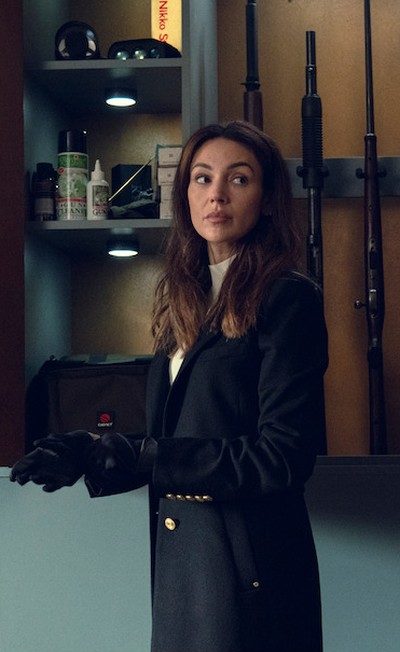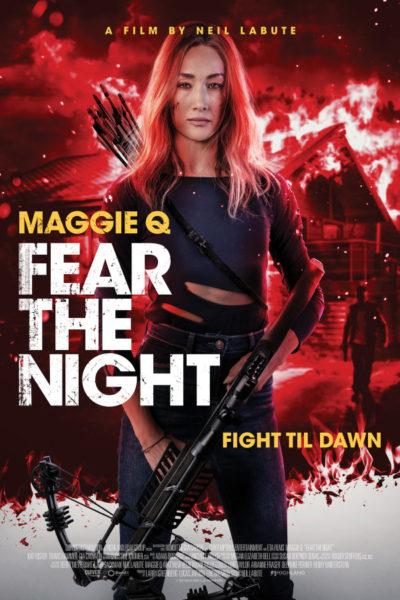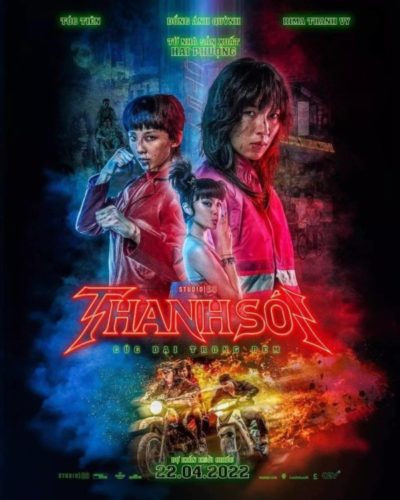★★
“Interesting premise, incredibly bland execution.”
 I liked the idea of this. A gang of five thieves, four women and Liev, give up the game after a robbery goes wrong and Liev gets arrested. He doesn’t give up his accomplices, who include his pregnant girlfriend Willa (Banus), and goes to jail. Six years later their daughter falls ill, and desperately needs matching tissue to repair her heart valve. The bad news: it has to be her father, who’s still in prison. Worse news: he’s in a coma, having been beaten up on the orders of the governor. Willa decides to put the band back together, along with an unlicensed surgeon, to break into prison, and extract the necessary tissue to save her daughter.
I liked the idea of this. A gang of five thieves, four women and Liev, give up the game after a robbery goes wrong and Liev gets arrested. He doesn’t give up his accomplices, who include his pregnant girlfriend Willa (Banus), and goes to jail. Six years later their daughter falls ill, and desperately needs matching tissue to repair her heart valve. The bad news: it has to be her father, who’s still in prison. Worse news: he’s in a coma, having been beaten up on the orders of the governor. Willa decides to put the band back together, along with an unlicensed surgeon, to break into prison, and extract the necessary tissue to save her daughter.
That’s not something I’ve seen in a film before. It’s certainly a twist on the usual “women in prison” subgenre, and the scope for a tense thriller, as the reverse heist unfolds, is obvious. Unfortunately, it’s the best part of an hour before we get to the execution, and there’s not enough to retain interest. It doesn’t help that the plot has so many holes through which you could drive an oil tanker. For example, Flynn (Ma) gets a job in the prison library, becoming the gang’s inside woman. She’s gaily snapping cellphone photos inside the jail, when two minutes of Googling confirms exactly what I suspected – that every prison I could find, has an almost zero tolerance policy for mobile devices.
Though in general, this correctional facility has security roughly comparable to your local electronics store, and you will be left with little confidence in just about anyone involved in the penal industry. Not that Willa and her team can really claim the moral high ground here, if you think about it. They are the “good girls” only because the film tells us they are. Given the first thing we see them do is robbing an armoured truck by threatening the driver with an explosive device, I’m not sure that’s truly the case in any court of morality. I’d rather have seen them embrace this ambiguity in some way, rather than dropping in a cliche straight from a Lifetime movie, a desperately ill child. Who can possibly root against Willa now?
Indeed, in tone, a lot of this feels like it could have straight in from a TV movie. Things do pick up somewhat down the stretch, not least with some unexpectedly graphic open-heart surgery, and when Willa is forced to make an unexpectedly difficult choice. However, it likely counts as a minimal spoiler to say that all ends well – at least, for the majority of the cast – with justice served on the bad people. [Robbery, it appears, does not count…] From a technical point of view, it’s reasonably well-assembled: “competent” would be the word, though it’s equally lacking in flair. The highest praise I can give this, is to say that I did not fall asleep. Might have been close in the first hour.
Dir: Ted Campbell
Star: Camila Banus, Jasmine Shanise, Virginia Ma, Shonte Akognon





 Well, after taking ten years to get from the third film to the first, the gap between first and second is
Well, after taking ten years to get from the third film to the first, the gap between first and second is  El Jardinero
El Jardinero If you fed an AI all the sports movies ever made, and then asked it to write a script, what you’d get is likely something close to this. Here’s a challenge: write down ten clichés you find in a film like this, then watch the movie (conveniently embedded below), and see how many show up. I’m willing to bet most of those on your list would be present here. The main saving grace is that the execution is done with a complete lack of self-awareness. It feels as if the writers genuinely had no clue they were treading a path which was more of a groove. Everyone involved in this is so earnest, it just about gets away with it.
If you fed an AI all the sports movies ever made, and then asked it to write a script, what you’d get is likely something close to this. Here’s a challenge: write down ten clichés you find in a film like this, then watch the movie (conveniently embedded below), and see how many show up. I’m willing to bet most of those on your list would be present here. The main saving grace is that the execution is done with a complete lack of self-awareness. It feels as if the writers genuinely had no clue they were treading a path which was more of a groove. Everyone involved in this is so earnest, it just about gets away with it. Not many novels come with a ringing endorsement from a former director of the CIA, but Gina Haspel calls this “A thoroughly enjoyable, engrossing thriller.” Argue with her, and she’ll send you an exploding cigar, or something. While it certainly isn’t bad, the rating above reflects its likely moderate appeal for readers here. A general audience might be more impressed, especially with regard to the second half, where the heroine becomes more of a passenger. Things begin at the very end of World War II with a flight out of Berlin carrying documents intended to secure the future of the Reich. It doesn’t reach its destination, crashing in the depths of the African jungle.
Not many novels come with a ringing endorsement from a former director of the CIA, but Gina Haspel calls this “A thoroughly enjoyable, engrossing thriller.” Argue with her, and she’ll send you an exploding cigar, or something. While it certainly isn’t bad, the rating above reflects its likely moderate appeal for readers here. A general audience might be more impressed, especially with regard to the second half, where the heroine becomes more of a passenger. Things begin at the very end of World War II with a flight out of Berlin carrying documents intended to secure the future of the Reich. It doesn’t reach its destination, crashing in the depths of the African jungle. Not to be mixed up with
Not to be mixed up with  This is a sequel to
This is a sequel to  Maya Stern (Keegan) is having a rough patch. A former helicopter pilot in the military, she was sent home and discharged under murky circumstances. While she was away, her sister was killed in what looks like a botched burglary, and not long after her return, husband Joe is also shot and killed in front of Maya, when they are walking in the park. But is everything what it seems? Because when checking the nanny-cam monitoring her young daughter, Maya sees a shocking site: her supposedly dead husband visiting the house. This kicks Maya into an unrelenting search for the truth, which will send her down a rabbit-hole and uncover a lot of sordid secrets, dating back decades.
Maya Stern (Keegan) is having a rough patch. A former helicopter pilot in the military, she was sent home and discharged under murky circumstances. While she was away, her sister was killed in what looks like a botched burglary, and not long after her return, husband Joe is also shot and killed in front of Maya, when they are walking in the park. But is everything what it seems? Because when checking the nanny-cam monitoring her young daughter, Maya sees a shocking site: her supposedly dead husband visiting the house. This kicks Maya into an unrelenting search for the truth, which will send her down a rabbit-hole and uncover a lot of sordid secrets, dating back decades. Director LaBute is best known around these parts for his ill-conceived remake of classic horror The Wicker Man, which is generally regarded as spectacularly bad, and is probably best-known for spawning memes involving Nicolas Cage and bees. So expectations going into this were… not high, shall we say. On that basis, the three-star rating is something of a pleasant surprise, though most of the credit for this should got to its star, rather than the director. Tess (Q) is a veteran of the war in Iraq, who is struggling to reconnect to her two sisters. Rose is getting married, and is nice enough that Tess is willing to attend her bachelorette party at the family cabin, deep in the country. But Beth (Foster) is a straight-up bitch.
Director LaBute is best known around these parts for his ill-conceived remake of classic horror The Wicker Man, which is generally regarded as spectacularly bad, and is probably best-known for spawning memes involving Nicolas Cage and bees. So expectations going into this were… not high, shall we say. On that basis, the three-star rating is something of a pleasant surprise, though most of the credit for this should got to its star, rather than the director. Tess (Q) is a veteran of the war in Iraq, who is struggling to reconnect to her two sisters. Rose is getting married, and is nice enough that Tess is willing to attend her bachelorette party at the family cabin, deep in the country. But Beth (Foster) is a straight-up bitch. This is a prequel of sorts to
This is a prequel of sorts to